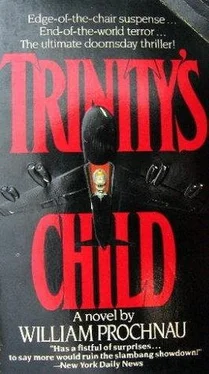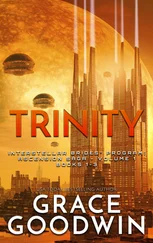“Are you injured, sir? Do you need assistance?” Harpoon signaled a nearby Air Force captain.
“No, no,” the man replied. His voice sounded very shaky. He started to droop against the bulkhead and the captain rushed to prop him up. “No!” he snapped. “Just get the others so we can get our tails out of here. Before the whole consarned state of Louisiana rushes us!” The captain drew back.
“How many others?” Harpoon asked.
“Four.”
The admiral craned his head out the door into the half-light. On the platform, several feet below, two rotund figures clambered desperately to get aboard. Two less frantic men stood behind them, their backs to the plane, their obscured hands occupied. A group of men in combat gear, their automatic rifles turned outward from the aircraft, shuffled uneasily on the stairs. In the distance Harpoon heard the sharp crack of high-powered rifles, deer rifles, and then a burst of popping return fire, military issue. Near the half-track an airport fuel truck burst in flames, the flare of the explosion capturing a camera-flick image of men and women charging the periphery. He wheeled on the captain. “Get those four aboard and seal this bird up fast,” he ordered.
Harpoon took the elbow of the dark figure next to him and felt a shiver run through the damp cotton of the man’s shirt. The presidential successor withdrew his arm quickly, as if to hide any hint of fear. Don’t cover it, Harpoon thought. You’ll need every ounce of fear you can muster, you poor bastard. The admiral had no idea who he was getting—couldn’t even remember his name, he had been buried in the isolated subterranean world of Omaha’s war-gaming computers so long. Just Number Eight, the Secretary of the Interior, code-named Condor. Harpoon was tired, overwrought, and edgy. He also was severely disillusioned four hours after he had seen his computer games become real life. All he knew was that he badly wanted a man with a healthy dose of fear, a dose as potent as his own.
“No time for pomp tonight, sir,” he said. “Would you please follow me?” The man edged gratefully away from the door and followed the tall, white-haired military man down a hallway toward dimmed lights. It was a strange aircraft aisle, its contours second nature to the admiral but disorienting to his companion. On one side the wall bent concavely, being the inner side of the aircraft’s outer shell. No windows looked out. Instead, occasional windows looked inward from the aisle’s other wall. They were thick panes through which the successor peered curiously at beehive compartments of men and women laboring with such preoccupation that they seemed totally unaware of the jungle world out of which he had just emerged. Their jungle, through which they struggled without a glance at their new leader, was a tangled maze of wires, cables, loose data boards, and crippled computer hulks.
“Lord A’mighty,” the man said wearily, “ol’ Harry Truman said he felt like a bale of hay landed on him. Must say I feel like I got the whole barn.”
“Afraid so, sir,” Harpoon replied, his impatience yielding to sympathy. “Maybe more.”
The man still peered in the window, his back to the admiral. “How bad is it?”
“Bad.”
“We losin’?”
Harpoon paused. He didn’t know how to answer.
“I asked you if we were losing.” The drawl disappeared from the man’s voice, a bite replacing it. From the back he looked like a cowboy. As the drawl faded, however, the cowboy appearance dissolved with it. Even dirty and rumpled, Harpoon observed, the jeans were a bit too stiff, the outdoors-man’s shirt a touch too new.
“I’m not sure that’s the issue, Mr. President,” the admiral volunteered cautiously. “You need to be briefed.”
“Not the issue?” The man spun on Harpoon, his face shimmering white in the hallway lights. His hand moved reflexively to his forehead, rubbing at dried blood that was not his own. “Believe me, mister,” he said firmly, no drawl left at all, “winning and losing are the only issues. I don’t need a briefing to know that.”
Without a further word, the two of them resumed their walk down the corridor, around a comer, and up a spiral staircase where Harpoon opened the door to the baby-blue presidential compartment, directing the man, then the others, toward seats inside.
Losing. Harpoon had known fear—that skin-crawling moment of sheer panic when a submariner feels the awesome power of the sea pressing down on him, his delicate mesh of men and machines failing. But he had never known anything like this, a fear that settled in the marrow and stayed there, gnawing. The world had built a similar mesh of men and machines, holding back a power far more awesome than the sea in a fragile balance that could never fail. It had failed and the mesh was unraveling like a dime-store sweater.
Harpoon had always had nagging doubts, sometimes raging nightmares, about a survival system that called for a never-ending balance of terror. Few men walked away from SlOP at night thinking the nuclear chess game would stay inside a computer forever, year after year, generation after generation. But the men—and then the machines that held the final thread in the weave—had failed so suddenly and so totally. In many ways the machines had been the greater faith of his generation of military men. They had asked for larger, more sophisticated submarines. And got them. Faster, more ingenious airplanes. And got them. Smarter, more deadly missiles. And got them. Then they had asked for more sophisticated, faster, smarter machines to control their machines. Computers to do the instant calculating and communications satellites to pass the instant orders. Encrypters to veil the orders and decoders to unveil them. Radios to talk underwater and through space. Scramble phones that, at the touch of a finger, instantly connected commanders and troops, friends and adversaries, on opposite sides of the globe.
Now, at the touch of another finger, all the machines that controlled the machines had died. SIOP had died predictably along with Icarus, vaporized in one of thousands of explosions each brighter than a thousand suns. The others had gone less predictably. Inside the greatest surviving communications machine in the world, this airplane, the admiral had watched the computers die, the radios go dead, the telephones fall silent, the mechanical eyes go blind. His staff had patched desperately and brought part of the system back to life for the man now sitting across from him. Losing. You bet we are, Mr. President. But not the way you mean it. Harpoon glanced at his watch—1012 Zulu. They were running out of time.
The successor watched Harpoon nervously look at his watch, then glance up at him. The man’s mind spun in a clutter of nagging, clawing, personal questions. Was his wife alive? Were his kids okay? Had the radiation already begun to burrow into his bones, chew into his lymph nodes? Every fiber of the man’s soul demanded answers. But he would not ask. In the agony of his journey through the Louisiana backwoods he had steeled himself to take control as quickly and decisively as Harry Truman. If a haberdasher could do it—a simple, unprepared tailor from Missouri—he could do it, too. History demanded it. His country, bushwhacked by godless tyrants in the middle of the night, demanded it.
The man shuddered involuntarily, tried to hide it, and sank deeper into his bright blue swivel chair, seeking some comfort from its fresh luxury even as the aircraft bounced erratically on the runway. He brushed at a cobweb tangle of wispy but tenacious Spanish moss still clinging to his jeans. The silken moss refused to dislodge, so he turned his attention instead to a bur snagged in his shirt. He tugged it loose and flicked the little irritant away, propelling it to a landing between the high-gloss black of the shoes across from him. Lord Almighty, losing’s not the issue. Truman would have ass-kicked this guy farther than he booted MacArthur.
Читать дальше












